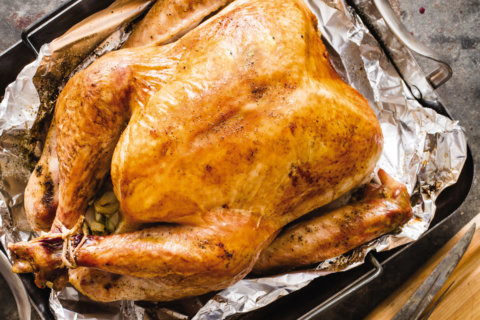WASHINGTON — Food scientists exploring issues, such as double dipping and the five-second rule, want to set the record straight without alarming you. But those activities can transfer “significant” levels of bacteria.
The goal behind the book “Did You Just Eat That?” is for people to be entertained and to get some good information, Paul Dawson, one of the co-authors, told WTOP.
“We’re not trying to scare people … but realize, people do get sick,” said Dawson, a Clemson University professor in the Food, Nutrition, and Packaging Sciences department.
Dissecting double-dipping
Dawson said some people inaccurately rationalize that biting a cracker leaves too little surface to hold a problematic number of germs. “We found there was significant transfer (of bacteria),” Dawson said.
Another interesting find is that the amount of bacteria transferred by double-dipping can vary depending on what you’re eating.
Tests determined bacteria is spread more easily with double-dipped salsa than with queso. “And that is related to the viscosity of the sauce, it being a thinner dip. Actually, more dropped back into the bowl that was contaminated than it would with a cheese that was adhering to the cracker better,” Dawson said.
Hand towels are more sanitary than bathroom blowers
Hospitals don’t use hand driers because Dawson said they can spread viruses and bacteria. Also, the driers just recycle room air that can contain dust and germs.
Thoughts on movie theater popcorn
Movie theaters are dark; people spill things, and you don’t know how often they’re cleaned.
“They’ve done some studies where they’re finding pretty significant levels of, they’re called biochemical markers, that was saliva, blood, fecal matter on movie seats and rails and seat cushions,” Dawson noted.
So, if you’re not careful and touch contaminated surfaces, then use that same hand to eat popcorn, Dawson said you’re transferring germs to yourself and to popcorn in the bag that can, in turn, transfer germs to anyone sharing the popcorn with you.
Avoid contaminated birthday cake
Dawson said you might want to avoid eating birthday cake, if the person blowing out the candles is sick and blowing ailment all over its surface.
Five-second rule
An experiment with different floor surfaces treated with salmonella revealed there were generally more bacteria transferred to a slice of baloney the longer it sat on the floor — though not by much.
“Significant amounts were transferred immediately,” Dawson stressed. “If the surface is contaminated, then it’s going to be transferred.”
Also, Dawson said, take into consideration the surface your food item is falling on. Dropped food is more likely to pick up pathogens in a hospital versus the floor of your home.
Wash hands after ordering food
Laboratory tests reveal contaminated hands transfer to menus significant amounts of germs that can survive a week or so.
“I don’t think many people, including probably the restaurant, think that menus are a source of cross contamination, when actually everybody in the restaurant probably handles the menu — the customers, the servers,” Dawson noted. “Anything that’s handled a lot has the potential for contamination.”
Use common sense
Again, none of this is intended to alarm you.
“Let common sense play a role without being paranoid,” Dawson advised.
WTOP’s Michelle Basch contributed to this report.







